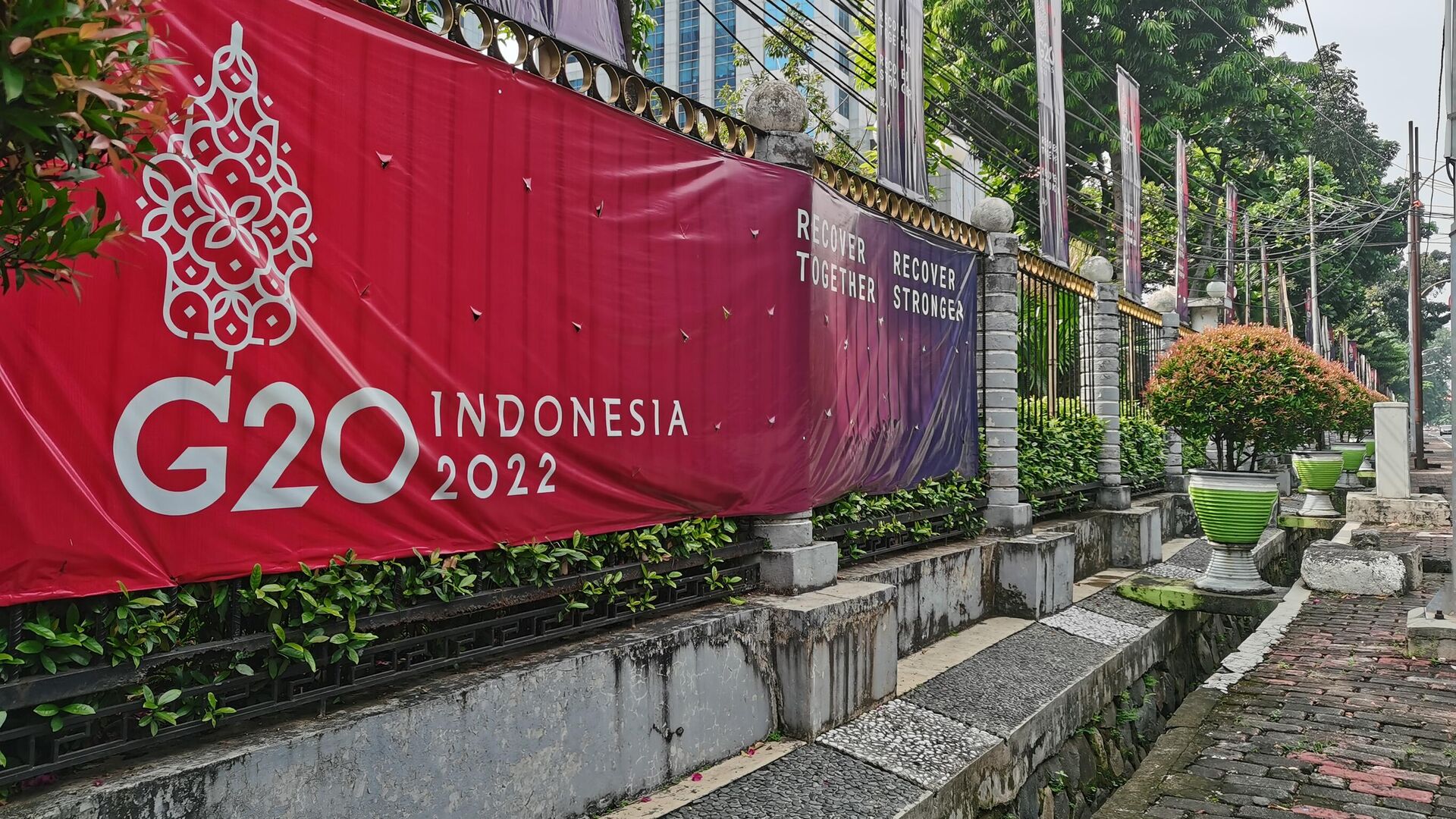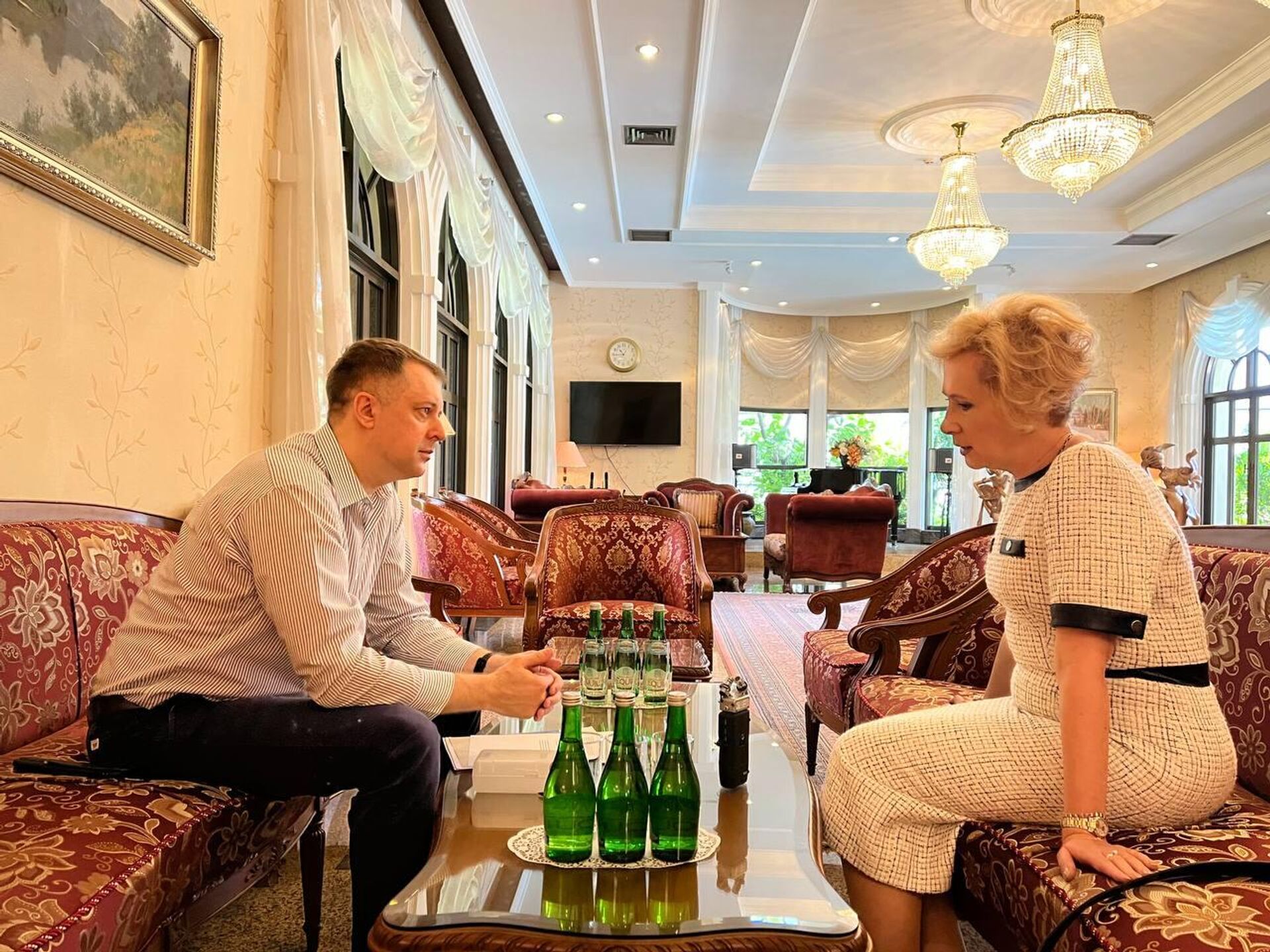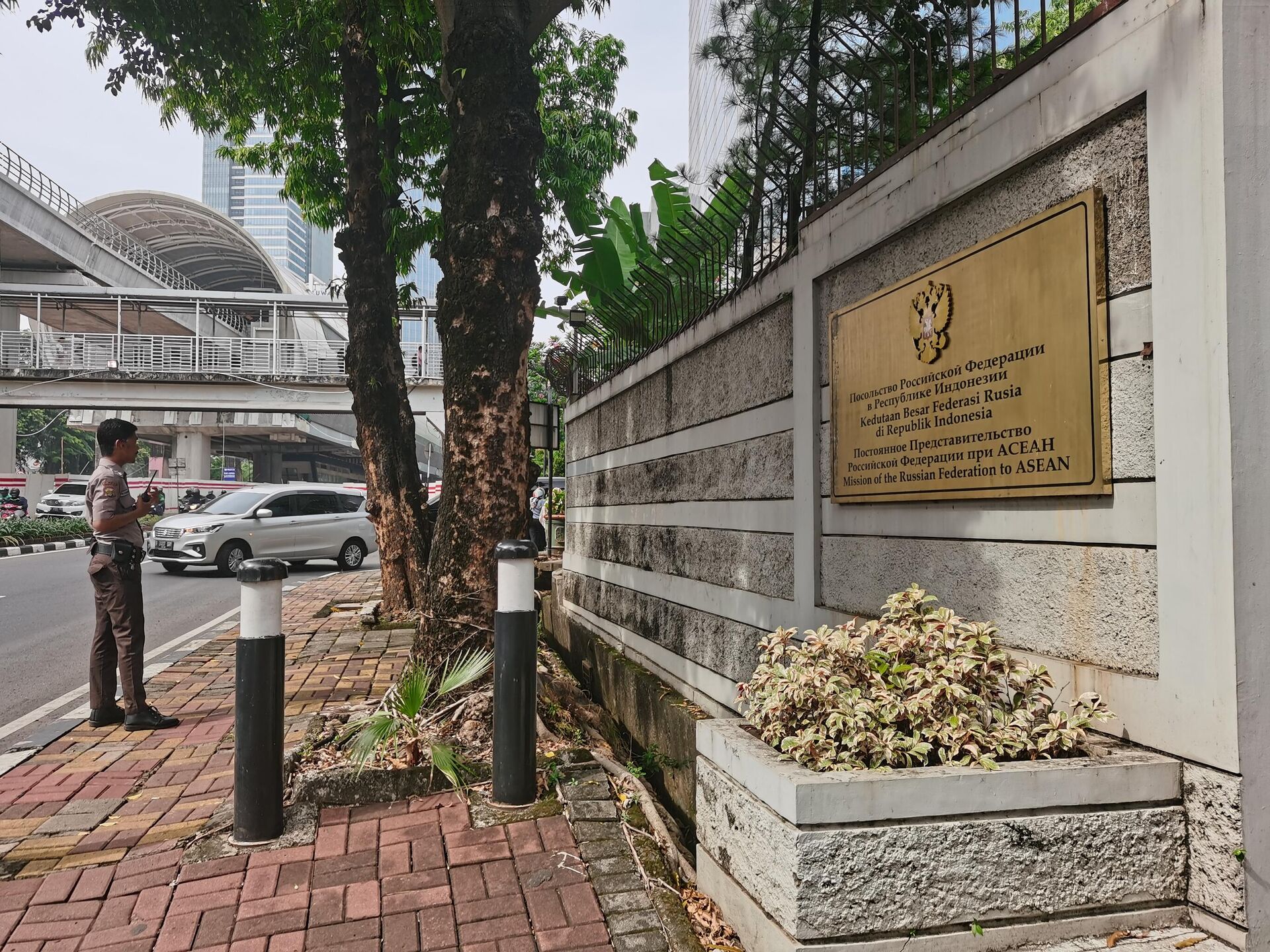https://sputnikglobe.com/20220517/efforts-to-exclude-russia-from-g20-absolutely-illogical-says-russian-ambassador-to-indonesia-1095564378.html
Efforts to Exclude Russia from G20 'Absolutely Illogical', Says Russian Ambassador to Indonesia
Efforts to Exclude Russia from G20 'Absolutely Illogical', Says Russian Ambassador to Indonesia
Sputnik International
As Indonesia prepares to host this year’s G20 summit, which is scheduled to take place in November, the nation is refusing to yield to pressure from the West... 17.05.2022, Sputnik International
2022-05-17T11:28+0000
2022-05-17T11:28+0000
2022-05-17T11:30+0000
world
g20
russia
https://cdn1.img.sputnikglobe.com/img/07e6/05/11/1095563882_0:348:2731:1884_1920x0_80_0_0_cbd50be83a2f017e3cbedc9776b418d2.jpg
Russia’s Ambassador to the south-east Asian nation, Lyudmila Vorobieva, says Moscow’s representatives are already participating in G20 meetings - both online and in person, locals are refraining from animosity towards Russians, and bilateral relations between the two nations remain strong.Sputnik: The EU and the US are waging an economic war against Russia, but it doesn’t seem that in a multi-polar world they are able to get everyone else to back them. Indonesia is one of the countries which refused to impose sanctions against Moscow. Is there a lot of economic cooperation between Russia and Indonesia at the moment, and, if so, what are some of the projects?Lyudmila Vorobieva: Yes, absolutely. Indonesia has not joined the economic war against Russia and, of course, they are experiencing a lot of pressure from western countries. But so far they have been resisting and conducting what Indonesia's government calls a free and active foreign policy. And of course, Indonesia has taken into account the traditionally friendly relations that exist between our two countries. Two years ago we celebrated the 70th anniversary of our diplomatic relations, and this positive trend in bilateral cooperation has continued. For instance, last year we saw a 40 percent leap in trade between Russia and Indonesia. In January we experienced a 60 percent growth in trade relations, and so far we don't see any intention from the Indonesian side to stop or to cut this kind of cooperation. Moreover, we feel that Indonesia might view this as a window of opportunity for Russia to turn more towards Indonesia, and for us to do more businesses in the Indonesian market.We have some joint investment projects that have been advancing very positively. The major one is building an oil refinery on Java Island in the city Tuban and it has been going on well. But also, we're discussing a lot of areas of cooperation that we can explore and that could be beneficial for both sides.The Indonesian Government should decide to adopt nuclear energy. So far it has not been taken, but we know Indonesia is weighing this option carefully, and we are ready to assist our Indonesian partners, and there have been communications on this issue between the two sides.We are cooperating in infrastructure. We have some Russian companies looking into, for instance, the control of traffic on the tolls. There is even a pilot project on one of the tollways near Jakarta to weigh the trucks which was launched successfully some time ago. So there are many opportunities and we hope that our cooperation will go on in a very positive way.And of course, I would like to mention a very big success story here: a Russian IT company has introduced an online taxi service and you can find its cabs in more than 60 Indonesian cities.Sputnik: Russia and Indonesia have been working for a long time to establish a strategic partnership. What has been done already to achieve that, and is it likely that you will see such an agreement being signed by the leaders of the two countries in the near future?Lyudmila Vorobieva: Indeed, we've been talking about establishing the strategic partnership between our two countries for some time, and have already completed the preparation of a declaration on strategic partnership that should be signed by the leaders of the two countries. We hope that when and if our President visits Indonesia, this declaration could be signed. I've already answered your question about some of the ways we are cooperating. We also enjoy a very active political dialogue with Indonesia. We've been working very closely in the United Nations, including the Security Council, when Indonesia was the non-permanent member of the Security Council. And the cooperation we had there was very constructive. The basis of it was that we have similar views on what is going on in the world, on the main issues of the global agenda. So of course, that makes a very good foundation to establish the strategic partnership. And also we've prepared a very considerable package of documents that could be signed during the visit or during the meeting of our two Presidents that should happen sometime in the future.Sputnik: Since you mentioned international cooperation on different platforms: there's been a lot of pressure from the West to exclude Russia from the G20 – a forum which Indonesia is hosting this year. What do you think about these attempts and how likely is it that we will see Russia’s participation in the G20 events?Lyudmila Vorobieva: Well, actually, G20 is a process, and it's not only the summit, but it's also a considerable number of meetings. According to our Indonesian partners, around 150 meetings have been planned, and Russia is taking an active part in these meetings offline and online. Only last week there was a working group on labour issues, and a Russian delegation participated in this meeting. And of course it will go on. And as for efforts to exclude Russia from G20 - of course, they're absolutely illogical and, it's a minority of countries that are trying to impose their will on the majority that have no intention of excluding Russia from this forum, including Indonesia, of course.Indonesia’s position was very balanced. Indonesia thinks that G20 is a forum that should discuss relevant global economic and financial issues, and the attention of this forum shouldn't be diverted by dragging in political crises that have no relation to the G20 agenda. And, so far, our Indonesian partners have successfully resisted this pressure from western nations.We support Indonesia's G20 presidency and the priorities that have been identified by Indonesia: the economy's recovery after the COVID-19 pandemic, strengthening the healthcare system, the energy transition, digital transformation - these are subjects which are most important for the world and we support them and support Indonesia's position.Sputnik: As the Russian Ambassador, you're putting a lot of effort into people's diplomacy. You address the Indonesian public directly, you give interviews often, you meet with local NGOs. How are Russia and Russian culture regarded by Indonesians, and what kind of feedback do you get from these meetings?Lyudmila Vorobieva: Indonesians are very friendly by nature, and also have a very warm affection, I would say, for Russia. Of course, this is based on our being old allies. We know very well that in the Sixties our countries were very close. President Sukarno (Indonesia's president from 1945 to 1967) visited our country four times and in Jakarta you can still see symbols of this friendship. There is an exact copy of Luzhniki Stadium that was built in the Sixties in Jakarta – the Gelora Bung Karno. There was a hospital which still exists as the hospital of friendship. There is a monument to independence, and most Indonesian people know about the help we lent Indonesia, including the assurance of territorial integrity in the Sixties. So, this warmth exists in and is supported by Indonesian people.But also, in recent events most Indonesians, though I would hesitate to say that they actively support Russia, at least there is no animosity. And I think that people do understand what еhe real cause of this conflict is; they may not have analysed it in depth but they understand it emotionally, because Russia has always been a friend of Indonesia. President Putin is enormously popular in Indonesia. Many Indonesians that I meet say: “President Putin is a great leader, every country needs a leader like President Putin.” And another factor, I would say, is that Russia has a big Muslim population, who are not immigrants, as we know. They are people who have been living in Russia for centuries - in Chechnya, Dagestan and other regions of Russia. And the fact that the Muslim population of Russia supports the policy of President Putin is also very important for Indonesians.So when I meet people here, I feel the warmth of their friendship and this very positive attitude towards our country. And for me, of course, it's an opportunity to let the people know Russia's position and how this crisis is unfolding. Unfortunately, the local media and the information they get takes guidance from the western media. So for me and the embassy, it's an opportunity to make our position known by people.
russia
Sputnik International
feedback@sputniknews.com
+74956456601
MIA „Rosiya Segodnya“
2022
Denis Bolotsky
https://cdn1.img.sputnikglobe.com/img/07e5/06/0b/1083128270_0:0:961:960_100x100_80_0_0_8cd81dafcbaac1c176c25141f8af1d2a.jpg
Denis Bolotsky
https://cdn1.img.sputnikglobe.com/img/07e5/06/0b/1083128270_0:0:961:960_100x100_80_0_0_8cd81dafcbaac1c176c25141f8af1d2a.jpg
News
en_EN
Sputnik International
feedback@sputniknews.com
+74956456601
MIA „Rosiya Segodnya“
Sputnik International
feedback@sputniknews.com
+74956456601
MIA „Rosiya Segodnya“
Denis Bolotsky
https://cdn1.img.sputnikglobe.com/img/07e5/06/0b/1083128270_0:0:961:960_100x100_80_0_0_8cd81dafcbaac1c176c25141f8af1d2a.jpg
g20, russia
Efforts to Exclude Russia from G20 'Absolutely Illogical', Says Russian Ambassador to Indonesia
11:28 GMT 17.05.2022 (Updated: 11:30 GMT 17.05.2022) As Indonesia prepares to host this year’s G20 summit, which is scheduled to take place in November, the nation is refusing to yield to pressure from the West and ban Russia from the global economic forum because of the situation in Ukraine.
Russia’s Ambassador to the south-east Asian nation, Lyudmila Vorobieva, says Moscow’s representatives are already participating in G20 meetings - both online and in person, locals are refraining from animosity towards Russians, and bilateral relations between the two nations remain strong.
Sputnik: The EU and the US are waging an economic war against Russia, but it doesn’t seem that in a multi-polar world they are able to get everyone else to back them. Indonesia is one of the countries which refused to impose sanctions against Moscow. Is there a lot of economic cooperation between Russia and Indonesia at the moment, and, if so, what are some of the projects?
Lyudmila Vorobieva: Yes, absolutely. Indonesia has not joined the economic war against Russia and, of course, they are experiencing a lot of pressure from western countries. But so far they have been resisting and conducting what Indonesia's government calls a free and active foreign policy. And of course, Indonesia has taken into account the traditionally friendly relations that exist between our two countries. Two years ago we celebrated the 70th anniversary of our diplomatic relations, and this positive trend in bilateral cooperation has continued. For instance, last year we saw a 40 percent leap in trade between Russia and Indonesia. In January we experienced a 60 percent growth in trade relations, and so far we don't see any intention from the Indonesian side to stop or to cut this kind of cooperation. Moreover, we feel that Indonesia might view this as a window of opportunity for Russia to turn more towards Indonesia, and for us to do more businesses in the Indonesian market.
We have some joint investment projects that have been advancing very positively. The major one is building an oil refinery on Java Island in the city Tuban and it has been going on well. But also, we're discussing a lot of areas of cooperation that we can explore and that could be beneficial for both sides.
Of course, if we consider our combined population, Russia and Indonesia have around 400 million people, so what we're doing now is not enough. It doesn't reflect the potential of our two countries. So we are talking about having more cooperation in the energy sector, even nuclear energy.
The Indonesian Government should decide to adopt nuclear energy. So far it has not been taken, but we know Indonesia is weighing this option carefully, and we are ready to assist our Indonesian partners, and there have been communications on this issue between the two sides.
We are cooperating in infrastructure. We have some Russian companies looking into, for instance, the control of traffic on the tolls. There is even a pilot project on one of the tollways near Jakarta to weigh the trucks which was launched successfully some time ago. So there are many opportunities and we hope that our cooperation will go on in a very positive way.
And of course, I would like to mention a very big success story here: a Russian IT company has introduced an online taxi service and you can find its cabs in more than 60 Indonesian cities.
Sputnik: Russia and Indonesia have been working for a long time to establish a strategic partnership. What has been done already to achieve that, and is it likely that you will see such an agreement being signed by the leaders of the two countries in the near future?
Lyudmila Vorobieva: Indeed, we've been talking about establishing the strategic partnership between our two countries for some time, and have already completed the preparation of a declaration on strategic partnership that should be signed by the leaders of the two countries. We hope that when and if our President visits Indonesia, this declaration could be signed. I've already answered your question about some of the ways we are cooperating. We also enjoy a very active political dialogue with Indonesia. We've been working very closely in the United Nations, including the Security Council, when Indonesia was the non-permanent member of the Security Council. And the cooperation we had there was very constructive. The basis of it was that we have similar views on what is going on in the world, on the main issues of the global agenda. So of course, that makes a very good foundation to establish the strategic partnership. And also we've prepared a very considerable package of documents that could be signed during the visit or during the meeting of our two Presidents that should happen sometime in the future.
Sputnik: Since you mentioned international cooperation on different platforms: there's been a lot of pressure from the West to exclude Russia from the G20 – a forum which Indonesia is hosting this year. What do you think about these attempts and how likely is it that we will see Russia’s participation in the G20 events?
Lyudmila Vorobieva: Well, actually, G20 is a process, and it's not only the summit, but it's also a considerable number of meetings. According to our Indonesian partners, around 150 meetings have been planned, and Russia is taking an active part in these meetings offline and online. Only last week there was a working group on labour issues, and a Russian delegation participated in this meeting. And of course it will go on. And as for efforts to exclude Russia from G20 - of course, they're absolutely illogical and, it's a minority of countries that are trying to impose their will on the majority that have no intention of excluding Russia from this forum, including Indonesia, of course.
Indonesia’s position was very balanced. Indonesia thinks that G20 is a forum that should discuss relevant global economic and financial issues, and the attention of this forum shouldn't be diverted by dragging in political crises that have no relation to the G20 agenda. And, so far, our Indonesian partners have successfully resisted this pressure from western nations.
We support Indonesia's G20 presidency and the priorities that have been identified by Indonesia: the economy's recovery after the COVID-19 pandemic, strengthening the healthcare system, the energy transition, digital transformation - these are subjects which are most important for the world and we support them and support Indonesia's position.
Sputnik: As the Russian Ambassador, you're putting a lot of effort into people's diplomacy. You address the Indonesian public directly, you give interviews often, you meet with local NGOs. How are Russia and Russian culture regarded by Indonesians, and what kind of feedback do you get from these meetings?
Lyudmila Vorobieva: Indonesians are very friendly by nature, and also have a very warm affection, I would say, for Russia. Of course, this is based on our being old allies. We know very well that in the Sixties our countries were very close. President Sukarno (Indonesia's president from 1945 to 1967) visited our country four times and in Jakarta you can still see symbols of this friendship. There is an exact copy of Luzhniki Stadium that was built in the Sixties in Jakarta – the Gelora Bung Karno. There was a hospital which still exists as the hospital of friendship. There is a monument to independence, and most Indonesian people know about the help we lent Indonesia, including the assurance of territorial integrity in the Sixties. So, this warmth exists in and is supported by Indonesian people.
But also, in recent events most Indonesians, though I would hesitate to say that they actively support Russia, at least there is no animosity. And I think that people do understand what еhe real cause of this conflict is; they may not have analysed it in depth but they understand it emotionally, because Russia has always been a friend of Indonesia. President Putin is enormously popular in Indonesia. Many Indonesians that I meet say: “President Putin is a great leader, every country needs a leader like President Putin.” And another factor, I would say, is that Russia has a big Muslim population, who are not immigrants, as we know. They are people who have been living in Russia for centuries - in Chechnya, Dagestan and other regions of Russia. And the fact that the Muslim population of Russia supports the policy of President Putin is also very important for Indonesians.
So when I meet people here, I feel the warmth of their friendship and this very positive attitude towards our country. And for me, of course, it's an opportunity to let the people know Russia's position and how this crisis is unfolding. Unfortunately, the local media and the information they get takes guidance from the western media. So for me and the embassy, it's an opportunity to make our position known by people.







